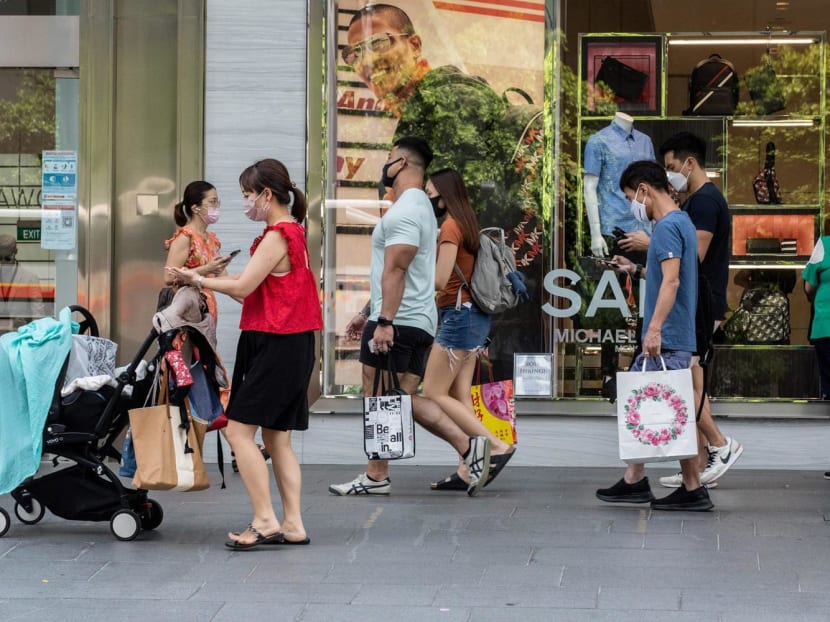No change to Govt's GST increase timeline amid concerns over inflation, economic risks

- The timeline for introducing a hike in Goods and Services Tax will not be revised despite concerns over inflation
- Finance Minister Lawrence Wong said the Government has already pushed back the increase to "as late as possible"
- It is also handing out a "generous offset package" to help the population with rising costs of living
- Should the global and domestic economy slow down to a point of recession, the Government will look at how to help Singaporeans tide through the situation, he said
SINGAPORE — The timeline for introducing a hike in Goods and Services Tax (GST) will not be revised despite concerns over inflation, Deputy Prime Minister (DPM) Lawrence Wong said on Tuesday (June 21).
Responding to a question by the media at a press conference announcing a new S$1.5 billion support package to help Singaporeans deal with rising costs, Mr Wong, who is also Finance Minister, said that the Government had already debated extensively on the necessity to increase the GST from 7 to 9 per cent.
It had already examined various possibilities such as property tax and luxury car tax to bring in extra revenue, but these alternatives will not be enough to support the nation’s spending needs, he said.
However, DPM Wong said the Government recognises that there are uncertainties ahead, which is why it has pushed back the hike to "as late as possible" and is "handing out a generous offset package".
“Most will not feel the impact for least five years. For the lower-income groups, they will not feel the (GST hike) impact for 10 years,” he said.
Plans for the GST rate increase was first announced by then Finance Minister Heng Swee Keat back in 2018, but the actual rollout was announced during the Budget in February this year.
HEALTHY GROWTH EXPECTED THIS YEAR
In response to a question about the global inflation outlook on Monday, Mr Wong said that there are more downside risks, but Singapore's economy is still growing for now.
“The forecast will be updated by the Ministry of Trade and Industry in due course (but) we still expect healthy growth this year,” he said, adding that there is considerable momentum behind the economy with borders opening and Covid-19 regulations being relaxed.
Although Singapore expects prices to continue to remain elevated for some time, the Monetary Authority of Singapore (MAS) has been vigilant and made moves “in a very timely manner” to tackle this as opposed to other central banks, Mr Wong said.
“Since October, MAS has already made three moves on inflation and we are still going through the effects of the monetary tightening and slowing down the momentum of price increases in our economy.”
The Government is keeping a close eye on the Covid-19 situation, which continues to pose a potential downside risk and may compound disruptions owing to the war in Ukraine.
At this stage, the extent of the economic slowdown is still unknown, Mr Wong said.
“It may well be that we are in a more benign situation where we are dealing with inflation, higher prices and more elevated prices, but overall, the global economy is still able to grow despite some slowing down."
On the other hand, should the global and domestic economy slow down to a point of recession, then the Government will look at how to help Singaporeans tide through such tough times.
SELLING PRICES OF COFFEE SHOPS, FUEL COSTS
Responding to queries on how high transaction costs of coffee shops have led to worries that it may lead to more expensive food, Mr Wong said that the best solution to this concern is to ensure the availability of affordable food options in all housing estates.
This may include having hawker centres, as well as coffee shops, run by social enterprises.
“And that will also put some competitive pressure in the market when it comes to some of these commercial transactions.”
At the same time, help will continue to be handed directly to Singaporeans through schemes such as the GST vouchers and Community Development Council vouchers.
On tackling rising petrol costs, Mr Wong said that energy prices have affected the whole world and are reflected in rising petrol, fuel and electricity prices in Singapore.
To tackle this, the Government is trying to accelerate the shift to cleaner and more energy-efficient vehicles.
“But we know that there are segments who are affected more badly this time and that's why in this package, we are providing more help for the specific segments, especially self-employed persons who rely on their vehicles for livelihoods,” Mr Wong said.











